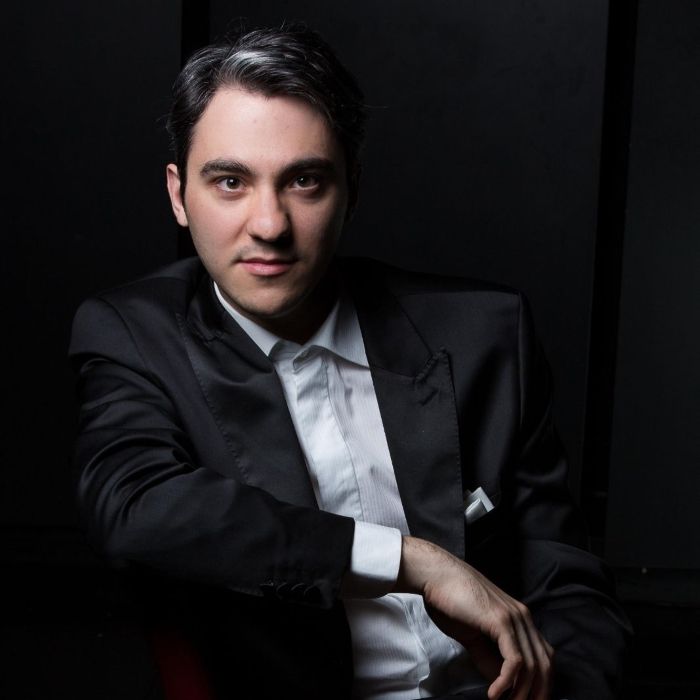Alexander Gadjiev is an artist who bridges two worlds. Everything about the 26-year-old pianist has come in pairs, from his birth in the twin cities of Gorizia and Nova Gorica on the Italy-Slovenia border, to his fascination with science and analysis on one hand and music and deep feelings on the other.

Even the first teachers of this intellectually curious artist came as a pair. “My parents – both professional pianists – were my first teachers,” he says, speaking from his home in Berlin. “I started lessons with my mother, Ingrid, when I was around four years of age. Then, I studied with my father, Siavush, whose style was formed in Russia.”
Studying at such a tender age with one’s parents can pose challenges for all involved, but the Gadjiev family proceeded with balance and caution. “With the emotional attachment between parents and child, it’s hard to be impartial and to determine whether the child is really talented or not,” Gadjiev reflects. “I think a key was not being too ambitious for me, not pushing too hard.”
At the age of nine, Gadjiev performed Haydn's Piano Concerto in C major with an orchestra in Italy and had his first recital a year later. But his keen interest in the world around him and in life’s big questions did not lead him to a conservatory education in his teens. Instead, he followed what we now call a STEM curriculum, rich in science and mathematics. “It’s almost a cliché to draw a parallel between music and mathematics,” he says, “but they have much in common. In high school, I wasn’t sure whether I would study music or science after graduation.”
Music obviously won that tug of war. But Gadjiev’s fascination with science, math and ideas has not waned. “I’ve been interested lately in 18th-century music, which has so much to do with structural and tonal relationships.” Patterns, whether musical or through the study of geometry, engage and connect Gadjiev to a broad vision of the world in which music plays an important, but not exclusive, part.
Gadjiev’s career has skyrocketed since the early years of the 21st century as he won top honours at several piano competitions, including first prize in the Hamamatsu International Piano Competition in 2015, one of the top ten piano competitions in the world. “Competing at Hamamatsu was a multi-dimensional experience,” the pianist reflects. “On the one hand, piano is an art, so why would you want to compete? On the other, it challenges you to be your best. So from a human point of view, playing in a competition is a very fulfilling experience. You’re practicing a long time and giving it your all. Plus, you get to meet new people.
“Hamamatsu was so welcoming and really took care of us. We got to know each other quite well and some of us have stayed friends until this day. This spirit, rather than just who won and who lost, should be emphasised,” he says warmly. “In the end, it’s a feast, it’s a moment of joy.”
Gadjiev was so impressed by Japan that he visited ten times during the six years since the competition. In addition, inspired to continue testing himself, he will enter the XVIII Chopin Competition in Warsaw in 2021.
Gadjiev sees music as far more than a contest, yet relishes performing before the world’s most exacting musical jurists. Winning major competitions like Hamamatsu can jump-start careers, and Gadjiev’s is no exception. He released an album, Literary Fantasies: Liszt and Schumann (Acousence Classics, 2018) and is planning another release featuring the music of Prokofiev in 2021. At the same time, his busy performing schedule continued to grow until the international hiatus caused by the global pandemic took effect in 2020. While acknowledging the devastating impact of the pandemic, with performing artists hit especially hard, Gadjiev noted that lockdowns and other restrictions did provide some quiet time for reflection and reassessment, musing on past influences, his own evolving style, and new music in the 21st century.
A classically trained pianist, the discovery of the music of Keith Jarrett when he was still a teen changed Gadjiev's life. Jarrett, an artist widely acclaimed for bringing together the classical and jazz worlds, electrified him. “It was a completely different experience than listening to Bach or Chopin,” he says. “I was just drawn to it, listening to his narrative, the incredible story he tells through his playing.” In particular, he was impressed by the Sun Bear album that Jarrett recorded in 1976 on a tour of Japan, which features more than six and a half hours of Jarrett’s solo piano performances.
“It was live, and Jarrett took some huge musical risks,” says Gadjiev, with a touch of awe and wonder in his voice. “The concerts were divided into two parts. Jarrett’s performances included a half hour or more of improvisations, allowing the artist to really create,” Gadjiev says, “and it’s clear he has huge knowledge of, say, counterpoint. He’s played a lot of Bach, a lot of Shostakovich, and you can hear it in the energy of this recording.” As a result, Gadjiev, too, has developed his skills at improvisation, occasionally including an improvised encore after a recital. “Sometimes,” he adds, “I wonder what might have been, whether I could have taken the path of a jazz musician!”
But Jarrett is not the only modern influence on this inquisitive young musician who frequently uses the word “exploring” to describe his relationship with the world around him. While Gadjiev is best known for his mastery of the Romantic repertoire, he has a strong affinity for many 20th-century composers, including Ligeti, Luciano Berio, Thomas Adès, Szymanowski and others. He mentions the father and son composers, Nikolai and Alexander Tcherepnin, and his intense admiration for Messiaen (Quartet for the End of Time and Twenty visions of the infant Jesus – he’s played no. 15).
Gadjiev has a particular affinity for Prokofiev, a composer who has been incorrectly pigeonholed as a Soviet-bloc perpetrator of steely, loud and aggressive music. “His music can be so lyrical and moving – the ballads in Romeo and Juliet, the slow movements of the sonatas and piano concertos,” he effuses.
“Contemporary music is something we enjoy, we listen to, we feel a duty towards,” he reflects. “At the same time, from the point of view of a pianist – it may be different for other instrumentalists – I’ve rarely heard someone say, ‘I love this new piece as much as the least sonata by Beethoven’ or something by Chopin or Bach, do you know what I mean? I’m not saying it is not good or worthy. It’s just that there are so many things to consider.” These influences, as well as his study of 18th-century music during the downtime of the pandemic, continue to shape his musical philosophy and style. Gadjiev also has become a student of Hungarian pianist and pedagogue Ferenc Rados.
“It’s really though encountering a different world,” he says, “a world that is in sync with the classical sensibility. It’s all about relationships in music: structure, forms, shapes. Not so much about effects, sound, and fireworks, but more about how things – notes, bars, chords – are related to each other.” Gadjiev is also exploring different techniques, such as playing with the entire upper digit of the fingers, not just the tips. And as his outer musical life evolves, so does the inner life, through the study of yoga. It is so important that he has a copy of the Indian spiritual classic, the Bhagavad Gita, within arm’s-reach during the interview. “If only we would focus on what we have in common, rather than what divides us,” he observes.
As Gadjiev absorbs these influences and new ways of thinking about music, how does he relate to the great composers who have given us such enduring and endearing creations? “I don’t like labels,” he says. “Jazz, classical, other titles no longer have the same meaning. There is just music: good music, bad music. Then, there is how a musician converses with the creators. For me, I would say I’m a little bit like a psychologist. Yes, I’m a psychologist for all these composers!” he says with a laugh. “I try to understand how to talk with them, what is the best way to approach them.
“Chopin often said that the score was not enough for everything he wanted to express. So, I think, can I add more of myself to the mix? Increasingly, I strive to combine the more fiery or the Russian-school side of playing with a more controlled way of meaning. It’s not always that easy because one can contradict the other. So, it’s about balance. What I’ve been trying to do lately is to use the minimal amount of movement possible, being economical with the means. In these works, I find a way to dig into myself and explore my inner world, my own emotions, rather than the music itself, and yet to be faithful in understanding the score.”
For Alexander Gadjiev, each performance is unique, a choice between the emotive and the analytical, and perhaps, at best, a bending of both. “It’s all about choices,” he says. “After all, I have a lifetime to get it right.”
----
With the Young Artists To Watch project Bachtrack aims to shine a bright spotlight on deserving artists from all over the world that might not be getting as much visibility as they would have without the limitations caused by the pandemic.
Find out more about Alexander Gadjiev:


